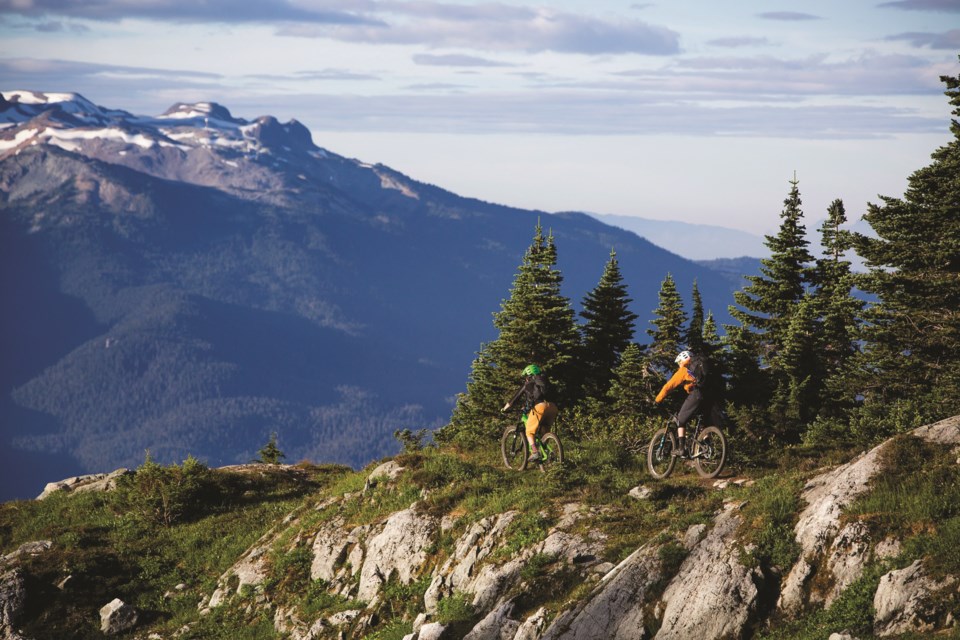After seeing municipal funding reduced last year due to COVID-19, Whistler organizations are grateful to see the spending come back in 2021.
At its May 18 meeting, Whistler council approved Fee For Service (FFS) funding for five local groups: Arts Whistler ($500,000); the Whistler Off-Road Cycling Association ($200,000); the Whistler Museum and Archives Society ($150,000); the Whistler Chamber of Commerce ($120,000); and Whistler Animals Galore ($101,071).
The financial boost is much appreciated by the Whistler Off-Road Cycling Association (WORCA), said president Dale Mikkelsen after the council meeting.
“It’s amazing … it’s going to be another hard year for everyone, and for the Resort Municipality of Whistler (RMOW) to find the resources to support us is pretty spectacular,” Mikkelsen said.
The money—up from $40,000 the group received last year (after it was scaled back from the originally promised $120,000)—will primarily be used for trail maintenance and tools, as well as major reroutes or corrections to trails, Mikkelsen said.
“Basically what it will allow us to do is employ a full trail crew of seven or eight folks for the duration of the riding season, which is amazing,” he said.
“Riding around trails early this season, we’re seeing the ones that definitely got ridden really hard last year, and certainly need some love this year, and so this will help us a lot.”
Some of those trails include those on the west side, and especially those at mid-level, or low elevation, “because they get ridden early and they get ridden all year long,” Mikkelsen said.
“So we’re talking like 99er, A Cut Above, AC/DC, a lot of those sort of Whistler classics that are in that low-elevation band.”
A 2017 economic impact study found that WORCA-maintained trails generated more than $13 million in initial expenditure and nearly $16 million in industry output.
At Arts Whistler, 2020 FFS funds dropped from an initial pledge of about $698,000 to $400,000, said executive director Mo Douglas, adding that the lower spend was still greatly appreciated.
“That made a big difference in us actually continuing to stay active … there was a point where we weren’t sure what our future held,” Douglas said.
“So between the RMOW and the Canadian Emergency Wage Subsidy, it saved the life of Arts Whistler.”
In 2021, the $500,000 will help Arts Whistler operate the Maury Young Arts Centre, pay its staff, invest in and showcase local artists, and host events like Art on the Lake… Literally, the Anonymous Art Show and the Whistler Children’s Festival (to name just a few—find the latest at artswhistler.com).
“We’re also working on artist opportunities online where we can build up our artist database and opportunities to hire those folks, or people that are offering courses, that kinda thing,” Douglas said. “So how can we support artists with their own initiatives along with where we can hire them?”
In the fall, Arts Whistler is looking at some “really robust programming,” Douglas said, including the Hear & Now festival, which showcases local musicians.
For the small-but-mighty team at the Whistler Museum, seeing its initial 2020 FFS commitment of about $178,000 shrink down to $81,724 may have spelled disaster if not for the help of museum-specific funding streams like the Museum Assistance Program and a grant from the BC Museum Association.
With those in play, the museum was able to close out 2020 pretty much even, financially, said executive director and curator Brad Nichols.
“The museum is truly reliant on the FFS program to keep our three core staff members employed, and we can use that to leverage other grants and for projects and hiring other students and interns,” Nichols said.
“But that funding is essential for those three core staff members.”
Work in recent years to digitize the museum’s various collections proved fruitful when the pandemic hit, as it’s been incorporated nicely into the museum’s Virtual Speaker Series.
“We had a lot of content that we’d been digitizing over the past few years with our photos and videos, and were able to use that to engage the community as well,” Nichols said. “So we were really set up for that.”
The museum is still working towards building a new permanent home, and “finding a location has been the largest hurdle for us at this point,” Nichols said, adding that there will be more to say on that at the museum’s annual general meeting on June 16 (find more info at whistlermuseum.org).
The RMOW provides FFS funding to organizations providing services that, if those organizations didn’t exist, would fall to the municipality.
The money comes from property taxes, municipal and regional district taxes, and the Resort Municipality Initiative.




